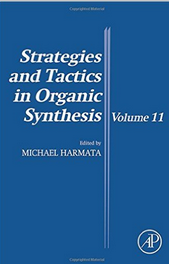 [about the author]
[about the author]Professor Michael Harmata graduated from the University of Illinois-Chicago with honors and highest distinction in chemistry.
In 1980, he began graduate studies in chemistry at the University of Illinois-Champaign/Urbana where he was awarded a University Teaching Fellowship. He worked with Professor Scott E. Denmark on the invention of the carbanion-accelerated Claisen rearrangement. In his second year of study, he was awarded an Eastman Kodak Research Fellowship.
Upon graduation in 1985, he was awarded an NIH postdoctoral fellowship which he used to study with Professor Paul A. Wender at Stanford University, where he worked on the synthesis of the neocarzinostatin chromophore.
In 1986, Prof. Harmata began his independent career at the University of Missouri-Columbia. He became an Associate Professor in 1992 and a full professor in 1998. In 2000, he was named the Norman Rabjohn Distinguished Professor of Chemistry in recognition of his achievements in research and teaching. In 1998, he received a research fellowship from the Alexander von Humboldt Foundation and stayed for a year at the University of Göttingen where he was affiliated with the groups of Professors Reinhard Brückner and Lutz. F. Tietze. In 2000, he served as chair of the Gordon conference on Organic Reactions and Processes. In 2010, he was named the first Justus Liebig Professor of Chemistry at the Justus Liebig Üniversität in Giessen, Germany. In 2011, he was a JSPS fellow. He has been a visiting professor in Giessen and Strasbourg and has delivered over 180 invited lectures in the United States and Europe. He is a member of the American Chemical Society, Gesellschaft Deutscher Chemiker, International Society of Heterocyclic Chemistry, and the Alexander von Humboldt Association of America.
[Table of Contents]
Preface, Michael Harmata 1. Acortatarin A: Spiroketalization Methods and Synthesis, Barry B. Butler, Jr. and Aaron Aponick 2. Devising New Syntheses of the Alkaloid Galanthamine, a Potent and Clinically Deployed Inhibitor of Acetylcholine Esterase, Martin Banwell, Joshua Buckler, Colin J. Jackson, Ping Lan, Xinghua Ma, Eliška Matoušová and Jeremy Nugent 3. Discodermolide: Total Synthesis of Natural Product and Analogs, Jean-François Betzer 4. A Walk across Total Synthesis of Mycolactone Analogs - Mechanistic Implications in Mycobacterium ulcerans Infection, Nicolas Blanchard 5. Total Synthesis of the Fungal Metabolite Virgatolide B, Paul A. Hume, Daniel. P. Furkert and Margaret A. Brimble 6. The Role of Serendipity and Design in the Development of Oxidative Coupling Reactions, Brenton DeBoef 7. Overcoming Electronics with Strategy: Development of an Efficient Synthesis of a Novel Antiretroviral, BMS-663068, Ke Chen, Christina Risatti and Martin Eastgate 8. Synthesis of Alkaloids Containing a Quinolizidine Core by Means of Strategies Based on a Hydroformylation Reaction, Nicolas Girard 9. Total Synthesis of Sorbicillactone A: An Inspiration for Methodology and Catalyst Development, Kelly A. Volp and Andrew Harned 10. Total Synthesis of (-)-7-Deoxyloganin exploiting N-Heterocyclic Carbene Catalysis with α,β-Unsaturated Enol Esters, Lisa Candish and David W. Lupton 11. The Realization of an Oxidative Dearomatization-Intramolecular Diels-Alder Route to Vinigrol, Cristian Draghici and Jon T. Njardarson 12. Total Synthesis of Communesin F and Perophoramidine, Dan Zhang, Hao Song and Yong Qin

 新书报道
新书报道